Ellen and Jim Have a Blog, Too
We are two part-time academics. Ellen teaches in the English department and Jim in the IT program at George Mason University.


The 1972 BBC _Emma_: a parallel insult scene · 8 August 07
Memo: another idea for that sequel: the scene at Emma’s dinner party where Jane Fairfax is harassed and pressured not to get her letters. Several of the scenes in Part 4, Episode 5 (“Hard on the Ears”) of the 1972 BBC Emma show Jane (Ania Martin) isolated and desperate, depressed. Here is one sequence. It opens with still Jim pronounced, “Jane Wallflower,” left out, marginalized:
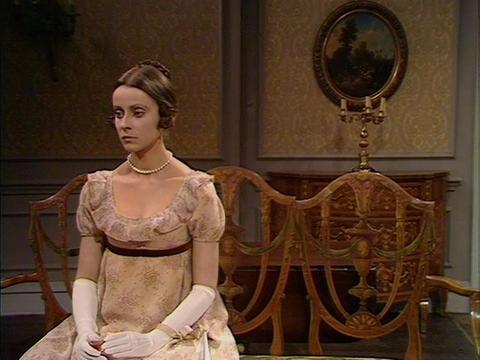
Jane Fairfax (Ania Martin) at dinner party at Hartfield
Very like his later behavior when he asked the snubbed Harriet Smith to dance, Mr Knightley comes over to engage Jane in conversation, and he perceives her melancholy:
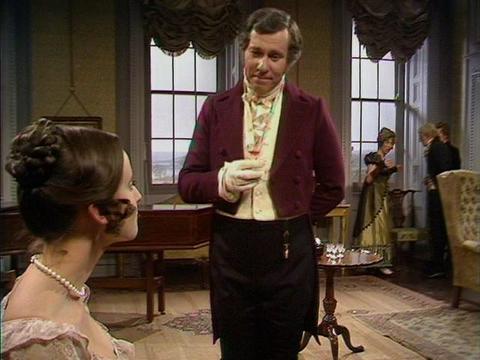
Mr Knightley (John Carson) coming over to Jane Fairfax
She is grateful:
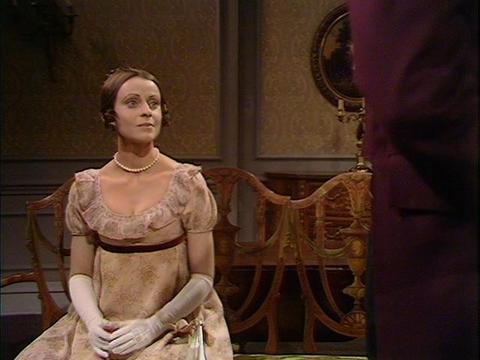
Jane (Ania Martin) looks up at Mr Knightley
But as scene progresses Jane soon finds herself the target of Mrs Elton’s officious domineering and suffocation from the well-meant but harassing concern of Mr Woodhouse and Mrs Weston over her letters. She should not go to the post office to collect her own letters. They will send for her. Mrs Elton wants to show off how many servants she has. But then Jane’s secret would be out and she might soon no longer receive her beloved Frank’s missives.
Not everyone notices Jane’s distress. No one knows it also comes from the references to Frank’s letters, Frank’s handwriting, one specimen of which is undoubtedly somewhere tucked into her dress. When Mr Elton (Timothy Peter), that ordinary man hints to his wife (not believing it himself), Jane may be getting letters from an admirer, the highly sexualized Mrs Elton (a grating overwhelming presence, Fiona Walker) played as an obtusely cruel yet socially anxious presence, who functions as the kind of friend who behaves worse than an enemy. Mrs Elton bursts into uproarious laughter. Jane have a lover? She just cackles with hilarity at the notion.
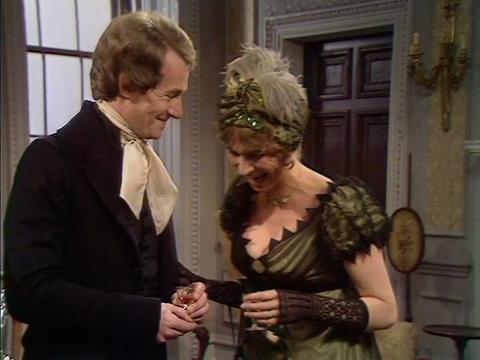
Mrs Elton (Fiona Walker) crudely obtusely insulting Jane
This treatment is the more than the equivalent of Emma’s insult of Miss Bates at Box Hill. Jane’s mortification is the more complete the quieter and more incisively withdrawn she becomes:
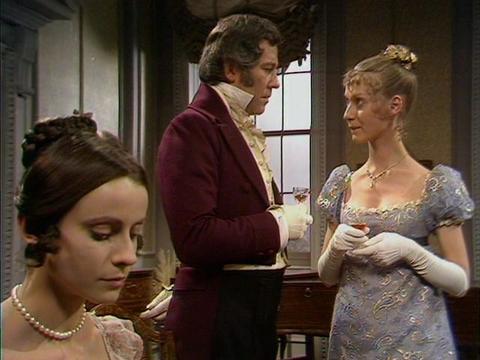
Humiliated and harassed Jane Fairfax (Ania Martin) with Mr Knightley (John Carson) quietly concerned for her and Emma (Doran Goodwin) standing by (Emma) (BBC 1972)
And Emma (Doran Goodwin) begins to emerge as a far more sympathetic presence when she produced lines (in Austen’s original also from Mr John Knightley) about letters (well-meant in that she thinks they are impersonal) and tries to change the subject. The scene works better for the viewer if you have picked up all the clues the film-makers have repeatedly planted to make you guess Frank is Jane’s hidden lover.
And later that evening Mrs Elton accosts Jane with insistent plans for her becoming a governess. Who would go out?
The autobiographical connection to Austen is her letters to her sailor brother, Frank (scenes unerringly also chosen by the 1983 BBC Mansfield Park in moving imitation), Austen’s hidden love (?), and yes her old maid status.
But I would retell these scenes from a new character Jane’s point of view.
The whole of the last of Part Four and Five and Six of this older Emma (screenplay Denis Constanduros, director John Glenister, producer, Martin Lisemore) are superlatively inventive and stimulating.
As with the closing scenes of the 1979 P&P, groups of lines and words are taken from one character and given to another (part John Knightley’s impersonal account of letters is also given to Mr Knightley who instead presents the words as kind encouragement to a lonely woman), and a whole new perspective on the novel’s original material given which enriches it—and seems to me to make a contemporary yet historical framework for that fiction I’ve long wanted to try again.
Once long ago I wrote a prequel: I was thirteen and wrote a short story out of Gone with the Wind. I wrote as Ellen O’Hara giving a barbecue and remembering back to before she was married and her love affair with a Philip something or other (a French name), a Burgo Fitzgerald type who died young (a gambler, duellist, alcholic). I left it behind when I left my first husband he destroyed it. It almost won a prize in a borough wide contest for junior high fiction. Almost never won the prize. I called it “Ellen’s Story.”
Chava
--
Posted by: Ellen
* * *
Comment
commenting closed for this article
